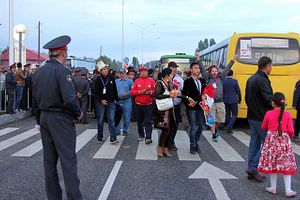In late October, Kyrgyz parliamentarians voted unanimously in favor of a law that set a strict five-day registration requirement for nearly all foreigners traveling in the country. This week, Prime Minister Sooronbai Jeenbekov signed a decree effectively reversing much of the registration law which — when it went into effect on November 4 — generated a significant backlash.
All states have the right to set rules regarding visitors, but it was clear the Kyrgyz had not fully thought through the administrative necessities for such a strict registration regime nor had parliamentarians anticipated the backlash. Kloop, a Kyrgyz media outlet, reported that some MPs seemed unaware, at best, of the broader impact of the law they’d unanimously passed. When the law went into effect, chaos reigned as foreigners tried to figure out how to register.
A week after the law went into effect, the State Registration Services proposed a draft resolution to allow the citizens of 67 countries to travel in the country for 30 days without registration. A few days later, the list was expanded to 92 countries and plans were to vary the length of unregistered stays, mostly between 30 and 90 days. With the approval of the new decree, there is a new master list of countries and lengths of unregistered stays.
The list of countries loosely matches those which have various levels of visa-free access to Kyrgyzstan. For example, most of Western Europe, as well as the United States and Canada, have 60-day visa-free travel and likewise are allotted 60 days without registering. Largely, these are countries from which Bishkek hopes to increasingly attract tourists.
Most travelers who are already required to obtain a visa for any length of stay will need to register, such as those from China and most African states.
There are some notable differences however between visa requirements and registration requirements.
Citizens of nine countries — the Bahamas, Venezuela, Greece, Georgia, Nicaragua, Peru, El Salvador, Turkey, and Ukraine — have 90 days before needing to register. Citizens of Georgia don’t need a visa, but the rest have to either get a visa for any length of stay or have 30 or 60 days visa-free. I haven’t thought of a good explanation for the odd concentration of Central American countries with longer no-registration periods. Turkey and Georgia (and also Ukraine, to an extent) make the most sense given historical ties and the business interests those countries have in Kyrgyzstan.
A look at the regional states is also interesting. Uzbekistan is not on the list at all. Citizens of Uzbekistan can travel without a visa to Kyrgyzstan for up to 60 days but they don’t seem to have been excepted from the registration law. Citizens from Tajikistan, who are not required to obtain a visa for any length of stay, must register after 60 days. Similarly, citizens of Kazakhstan and Russia, which do not need visas to visit Kyrgyzstan, have to register after 30 days. Turkmen and Iranian citizens, which both need a visa to visit Kyrgyzstan, have 10 and eight days, respectively, before needing to register.
Some of the logic that goes into the registration math surely takes into consideration Kyrgyz worries about foreign workers taking local jobs and potential sources of terrorists (indeed, terrorism was a major motivation for the initial registration law). As 24.kg reported, Kyrgyz authorities “applied the principle of reciprocity in respect to the citizens of a foreign country.” Uzbekistan, for example, requires travelers to register at each hotel they stay at and local authorities reportedly can be variably strict about enforcement. Turnabout, Bishkek’s calculation likely goes, is fair play.
After the registration law went into effect, many regional observers worried (rightly) that it would lead to more police (and men donning police uniforms) stopping foreigners, asking to see registration, and extracting a bribe to go away. There have been anecdotal reports of exactly that happening, and beyond Osh Bazaar in Bishkek where the scam is notorious.
Tourism operators, who agitated against the sudden registration law, will be happier with the new arrangement.
Note that all days regarding registration are understood to be “working days.” Always check with your embassy on visa and registration requirements before traveling.

































